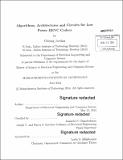Algorithms, architectures and circuits for low power HEVC codecs
Author(s)
Juvekar, Chiraag (Chiraag Shashikant)
DownloadFull printable version (9.158Mb)
Other Contributors
Massachusetts Institute of Technology. Department of Electrical Engineering and Computer Science.
Advisor
Anantha P. Chandrakasan.
Terms of use
Metadata
Show full item recordAbstract
In order to satisfy the demand for high quality video streaming, aggressive compression is necessary. High Efficiency Video Coding (HEVC) is a new standard that has been designed with the goal of satisfying this need in the coming decade. For a given quality, of video HEVC offers 2x better compression than existing standards. However, this compression comes at the cost of a commensurate increase in complexity. Our work aims to control this complexity in the context of real-time hardware video codecs. Our work focused on two specific areas: Motion Compensation Bandwidth and Intra Estimation. HEVC uses larger filters for motion compensation leading to a significant increase in decoder bandwidth. We present a novel motion compensation cache that reduces external memory bandwidth by 67% and power by 40%. The use of large, variable-sized coding units and new prediction modes results in a dramatic increase in the search space of a video encoder. We present novel intra estimation algorithms that substantially reduce encoder complexity with a modest 6% increase in BD-rate. These algorithms are co-designed with the hardware architecture allowing us to implement them within reasonable hardware constraints.
Description
Thesis: S.M., Massachusetts Institute of Technology, Department of Electrical Engineering and Computer Science, 2014. 30 Cataloged from PDF version of thesis. Includes bibliographical references (pages 81-84).
Date issued
2014Department
Massachusetts Institute of Technology. Department of Electrical Engineering and Computer SciencePublisher
Massachusetts Institute of Technology
Keywords
Electrical Engineering and Computer Science.